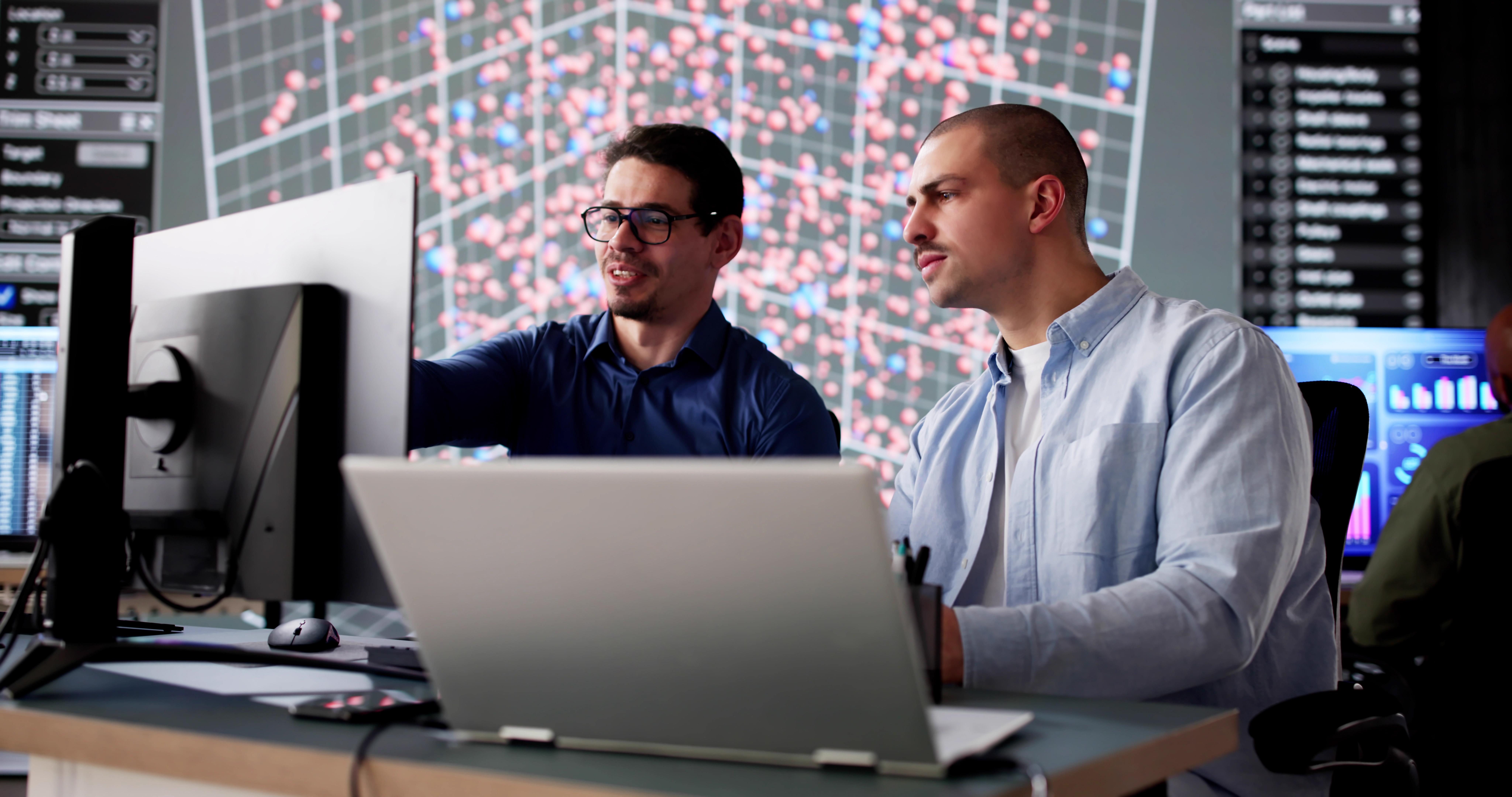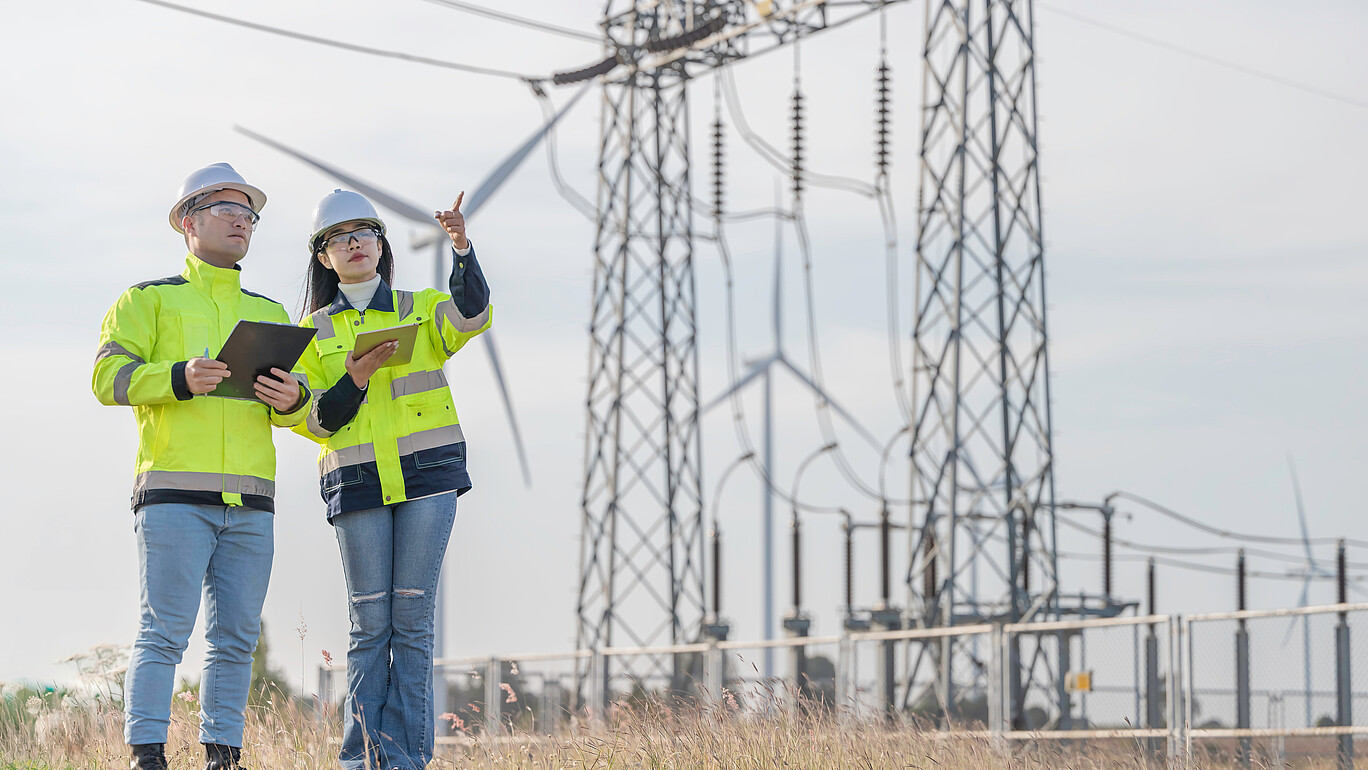15 January 2026
Find out more about the online university information day and register!
Immerse yourself in the world of our degree programs and experience campus life - conveniently from anywhere.
Electrical energy is the backbone of our modern society and at the same time a key to overcoming the climate crisis. The dual Diplom degree course in electrical power systems will train you to become a specialist who actively helps shape this technology of the future. The KIA (sandwich-style) degree course combines in-depth engineering knowledge with practical work experience and, after five years, you will graduate with two valuable qualifications: a Diplom-Ingenieur (FH) and a recognized professional qualification in an electrical engineering profession.
In this practice-oriented degree course, you will acquire comprehensive knowledge for the design of a sustainable energy supply:
Due to climate change, limited resources and the switch to renewable energies, our energy supply is facing profound changes. In this dynamic environment, your knowledge will make you a sought-after expert who develops innovative solutions for a reliable, sustainable and intelligent energy infrastructure. You will not only learn to understand existing systems, but also actively shape the decarbonization of the energy supply and the development of self-sufficient and autonomous energy concepts.
| Faculty: | Electrical Engineering and Computer Science |
| Location: | Zittau |
| Degree: | Diplom-Ingenieur/-in (FH) |
| Standard period of study: | 10 semesters |
| ECTS points: | 240 |
| Teaching language: | German |
| Enrolment for: | Winter semester |
| Application: 1.5. to 30.09. | Start of studies: October |
| Admission restriction: | admission-free (without NC) Details |
| No pre-study internship | to the student advisory service |
| Accreditation status: | accredited |
Your studies follow a well thought-out concept that optimally combines academic education and professional practice. In the first phase, you will acquire mathematical, scientific and electrical engineering fundamentals. You will alternate regularly between the university and the training company, combining theoretical knowledge directly with practical application and completing your first vocational qualification as an electronics technician after around two and a half years.
After this intensive foundation phase, you will specialize in one of two key areas: Renewable energy systems or smart grids and installations. You will deepen your knowledge in advanced subjects such as high-voltage technology, power generation and grid protection technology. An engineering internship gives you the opportunity to apply your knowledge in industrial practice. In the further course of your studies, you will deal with complex topics such as grid control systems, intelligent grid management and modern energy generation systems. Throughout your studies, you will have the opportunity to work on research projects carried out in cooperation with industry partners or at the university. The Diplom thesis is the culmination of your degree and demonstrates your ability to solve complex energy technology problems independently.
The semesters marked in light green (2.1 / 2.2 / 3.1 / 3.2) are part-time semesters. Here, the 2nd and 3rd semesters from the Diplom curriculum are each stretched over 2 semesters. You complete these in a 4-week rhythm at alternating learning locations (university/company). You will complete this study section with the 1st professional qualification (Chamber of Industry and Commerce examination). This results in a total of 10 semesters.
Compulsory elective module

Grid planning
You design and dimension electrical energy grids to meet the requirements of the energy transition. You calculate line capacities, simulate load flows and strategically plan grid expansion for renewable energies. Your analytical thinking and methodological expertise will ensure a reliable and future-proof power supply, even with a growing proportion of volatile energy sources.

Plant engineering
You will implement complex energy systems from initial planning through to commissioning. You will draw up circuit diagrams, supervise installation and commission substations, switchgear and power plant components. Your precise working methods and technical understanding ensure that these critical infrastructures function reliably and safely.

Grid management
You monitor and control electrical energy grids in real time. You respond to faults, carry out switching operations and ensure a balance between generation and consumption. Your decision-making skills and sense of responsibility ensure the continuous security of supply and stability of the electricity grid around the clock.

Renewable energy generation
You will develop and optimize systems for generating renewable energy. You plan solar and wind power plants, calculate yields and integrate these energy sources into existing supply structures. Your innovative spirit and commitment to sustainability will make a decisive contribution to the transformation of the energy system and climate protection.

Protection and control technology
You develop and implement systems to protect electrical installations and grids. You program protective relays, configure network control systems and ensure secure data transmission in critical infrastructures. Your technical expertise and safety awareness prevent major faults and damage to valuable equipment.

Energy consulting
You analyse energy consumption and develop optimization concepts for industry, municipalities and private households. You carry out measurements, identify potential savings and advise on the integration of renewable energies. Your communication skills and holistic understanding will help customers to cover their energy requirements sustainably and economically.
KIA is a dual course of study leading to a degree in engineering (Diplom-Ingenieur (FH)) - with integrated vocational training (including IHK/HWK qualification).
It combines theory and practice very intensively, creates an early bond with the future company and is therefore recommended by the state government of the Free State of Saxony and expressly demanded by the companies.
Our future KIA students apply to a company cooperating with the university up to one year before the start of their studies, have the university entrance qualification, are interested in scientific problems and have the necessary mobility.
The companies conclude a cooperation agreement with the university and contracts with the applicants for practical vocational training (vocational training contract or internship contract) or - in the case of KIApro- a qualification contract.
After the degree of a training contract or internship contract with the company, you still have to register at the university with your university entrance qualification - this is possible from mid-May.
The degree course usually begins on September 1st with 4 weeks of basic practical vocational training in the company. Depending on the degree program, you will then complete one to three semesters at the university.
The study-free periods between the semesters are reserved for practical training in the company. Training at the company takes place during the basic course of study according to the study schedule (e.g. alternating between the company and the university every 4 weeks) and ends with an examination at the relevant chamber (IHK or HWK). Separate vocational school lessons are not provided. The theoretical knowledge required for the vocational training is taught through the scheduled lectures and additional "vocational specifics" teaching units at the university. During the practical training period, you are entitled to collectively agreed leave and receive a monthly salary from the company, which is based on the remuneration for apprentices.
After completing the vocational training, the remaining semesters are completed as full-time studies with part-time work (often with a study support contract from your company) and end with the desired degree of Diplom-Ingenieur-/in (FH).
We now also offer our student advisory service via WhatsApp. Just send us a message to: +49 173 2086748
Studying with us is different. Above all, better. Why? We have a family atmosphere. There are small study groups and the lecturers are always there for you. There is a close connection to practice in all degree courses. And finding affordable accommodation is no problem here.
There are many other reasons, such as university sports or the student representatives, clubs and societies. Campus life in Zittau and Görlitz, the wild east, is unique.
Our newsletter provides you with regular tips and information about studying. From application strategies to student finance, we keep you up to date on everything you need to know. Subscribe to our newsletter now and always be well informed! ♥